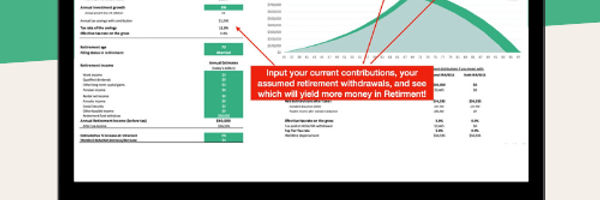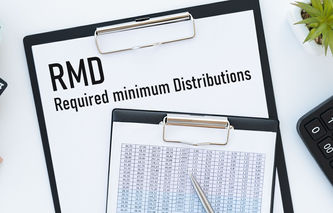As workers approach their peak earning years, many begin to think about questions like "When is the best time to retire?" We hear stories all the time about people living longer, which is good news. Individuals still thinking about retiring at age 62, need to figure out if their retirement plans are taking this new information into account.
Deciding when to retire is a very difficult decision for many of us. In this article, we're going to look at three distinct timeframes for retiring, and examine the pros and cons of each decision. We'll also talk about some of the planning tools that are available to help figure out how to create a retirement plan that allows someone to live comfortably in retirement and help you figure out how long will your money last.

Roth IRA or 401k? This template will answer your questions.
With this template, you will get:
All DFY, simply add your details
Charts for comparison and clear answer
Easily update for any year (2023, 2024, 2025, etc…)

Right Time to Retire
Figuring out the right time to retire is not an easy decision. We could make detailed retirement plans, and work those plans hard for 20 years, only to fall victim to health problems that might cut our retirement years short. We're going to take a more upbeat approach to retiring, and start out with a very simple assumption: We're all going to live a full and rewarding life in retirement. That being said, let's figure out the right time to retire.
Three Timeframes
There are no hard and fast rules that define retirement. But we can all agree retirement is the withdrawal from a traditional place of employment. Many people also view these years as an opportunity to semi-retire, and that usually means working in a more rewarding job; usually out of choice and not necessity.
With that as a background, there are three well-accepted timeframes in which to retire:
Early Retirement
Retiring "On Time"
Late Retirement
In the following sections we're going to discuss the advantages and disadvantages of each approach.
Retiring Early
One of the ways we can try to place boundaries around the early, on-time, and late retirement timeframes is by using Social Security benefits as a guideline. With that guide in mind, we're going to define early retirement as leaving the workplace before age 62. For many of us, that means leaving work behind between the ages of 55 and 62.
Pros and Cons of Retiring Early
The biggest benefit of retiring early is that it provides us with more time to pursue hobbies, and enjoy the "fruits of our labor." Even at age 55, many of us will have worked hard for 30 or more years. It's nice to be able to relax and enjoy ourselves after spending all of that stressful time in the workplace.
Unfortunately, there is a big downside of retiring early. If we go this route, then we need to consider the following:
Retiring early means having less time to accumulate retirement benefits. We will need to save more each year to make this a reality.
Income will have to last longer if we retire early. For example, if we retire at age 55 instead of 65, then we'll need ten more years of retirement income.
Pensions and Social Security may not be available right away. Even if we have a pension plan at work, our employer may restrict or reduce benefits before what they consider "normal" retirement age. In addition, Social Security benefits will not be available until age 62, and if we start collecting benefits right away, then they will also be reduced.
Finally, if we retire early, then we'll need to find, and pay for, health insurance until we qualify for Medicare.
The challenge with retiring early is we need more money in our retirement accounts, and there is a shorter timeframe to accumulate that money.
Pros and Cons of Retiring "On Time"
We're going to define "normal" or "traditional" retirement age as those years between age 62 and 67. In general, these are the years when we will qualify for early or full Social Security benefits. Most employees also seem to use the age of 62 as a guide for normal retirement age.
Perhaps the biggest benefit of retiring on time is that it allows us plenty of time to enjoy a healthy and fulfilling retirement. Other benefits of retiring on time include:
More time to create a substantial retirement fund. Putting money aside for retirement will be less painful as we watch the power of compounding interest grow our funds.
Paying for the expense of health care insurance is no longer a concern as we'll qualify for Medicare right away.
By retiring in a more traditional timeframe, we'll usually qualify for un-reduced pension benefits and Social Security.
On the downside, retiring on time means we'll have less time to pursue a potentially rewarding second career.
Retiring Later in Life
For many of us, remaining in the workplace past age 67 is a choice we will make because we simply enjoy what we do for a living. We will view maintaining a productive role in our companies and the daily interactions with our co-workers as a benefit that's hard to resist.
The biggest advantage of retiring late in life is that we have more time to save for retirement, coupled with fewer years over which we need retirement income. For example, if we decide to retire at age 70 instead of age 65, then we have five more years to save money, and five fewer years that we're using retirement income.
Other benefits of retiring late include:
Immediately qualifying for Medicare; although we might want to consider signing up at age 65.
By retiring late, we'll also continue to build up our pension plan, and in some cases qualify for higher Social Security benefits.
The down side of retiring later in life is simply that we'll have fewer retirement years. We'll also want to take into consideration "quality of life" issues if we decide to go this route.
Retirement Planning Tools
We're going to finish this article by running through some of the tools we have to help create viable retirement plans. Some of the articles we have on this topic include:
Online Retirement Calculators
We also have a complete set of online retirement calculators that can help individuals create a retirement plan, as well as help them figure out if their current plan is going to meet their objectives.
Some of the retirement calculators on this topic include:

Roth IRA or 401k? This template will answer your questions.
With this template, you will get:
All DFY, simply add your details
Charts for comparison and clear answer
Easily update for any year (2023, 2024, 2025, etc…)

Retiring from work is a very personal matter. It's a decision that can have a long and lasting effect on our lifestyle. It's important to balance the pros and cons of the decision using all the information and tools at our disposal.



